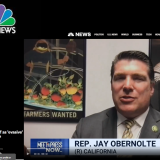In the News
Over the past several months, I’ve often been asked by reporters, fellow members of Congress and constituents alike what a future with artificial intelligence might look like and what role Congress should play in regulating this revolutionary technology. As the only member of Congress with a graduate degree in AI, and as a computer programmer who has written millions of lines of code over a 30-year career in software development, I’ve devoted substantial thought to these questions.
U.S. Rep. Jay Obernolte is taking the Department of Veterans Affairs to task over what he describes as a hostile work environment at Loma Linda VA Medical Center.
The only member of Congress with an advanced degree in artificial intelligence says lawmakers should move slowly to impose new regulations on AI, in part because policymakers and even experts in the field have yet to lay out clear regulatory objectives.
TikTok was centerstage on Capitol Hill, but the social media app’s future is still up in the air as Congress and President Joe Biden's administration weigh banning the platform.
TikTok CEO Shou Zi Chew testified before the House Energy and Commerce Committee for nearly five hours as lawmakers pressed him on the app’s national security threats given its ties to China and data privacy concerns, but seemed largely skeptical of his answers.
...
After TikTok’s CEO Shou Zi Chew testified on Capitol Hill and defended the app to lawmakers, Rep. Jay Obernolte (R-Calif.) joined Meet the Press NOW with his reaction.
...
Watch here.
One California congressman is suggesting what might seem to be a simple solution, but could have bigger impacts: permanently classifying fentanyl-related substances as a Schedule I narcotic in order to create programs to study the drug.
With the rise of artificial intelligence in our daily lives, members of Congress are trying to get ahead of the curve and ensure the technology doesn't get out of control.
And they're taking different approaches to find the best solution.
...
The winter storm that crashed into San Bernardino County mountain communities two weeks ago is officially a federal emergency.
A group of House Republicans introduced legislation Wednesday that would restrict California's ability to ban traditional gas-powered cars as part of the state's electric vehicle push.
As AI continues to grow in popularity, certain U.S. representatives are calling for further legislation around the technology, but knowledge about AI is weak. Rep. Jay Obernolte (R-CA) explains, “You’d be surprised how much time I spend explaining to my colleagues that the chief dangers of AI will not come from evil robots with red lasers coming out of their eyes.”










